Welcome to our free classical music site

Do you write about classical music? Are you a blogger? Want to team up with Classical Connect? Send us a message, let's talk!

Do you write about classical music? Are you a blogger? Want to team up with Classical Connect? Send us a message, let's talk!
This Week in Classical Music: March 9, 2020. The problem with Telemann. Georg Philipp Telemann, born in Magdeburg on March 14th of 1681, was one of the most prolific composers of his time, and probably of any time. If we consider his instrumental output, here’s what we see in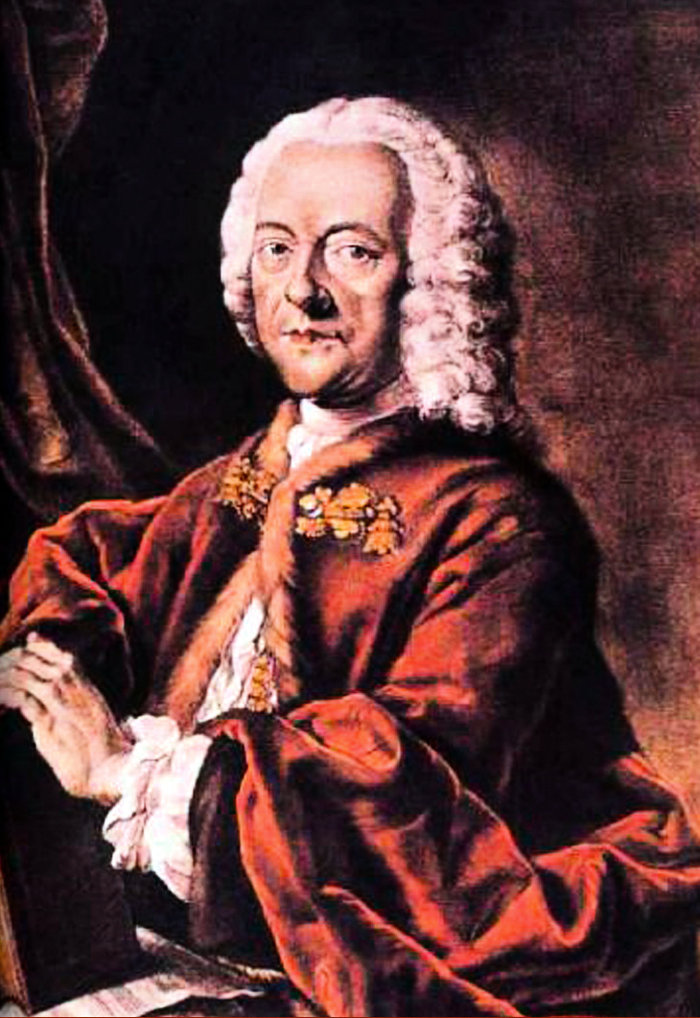 Grove: “125 orchestral suites, 125 concertos (for one to four soloists or without soloists), several dozen other orchestral works and sonatas in five to seven parts, nearly 40 quartets, 130 trios, 87 solos, 80 works for one to four instruments without bass and 145 pieces for keyboard (excluding two collections containing 50 minuets apiece).” But that’s just a small part of his output: church music constituted the bulk of it, and here the numbers are eye-popping: Telemann wrote more than 1700 cantatas! He also wrote several dozen operas. This creates a problem of vast proportions: how can we practically assess Telemann’s output, how can we compare the quality of different pieces, establish a “hierarchy” which may not be totally proper but could be useful in education and promotion of his music? Mozart wrote 41 symphonies, not all of them are equal but public perception is clear about the last three: they are considered his crowning achievement. Same is true with practically all other classical composers. But who would help us with Telemann? Was there a person who’ve heard, or at least read all of his music? Probably not. That makes listening to Telemann a rather frustrating experience, as what we hear (and what is being performed) is practically random. And Telemann was an uneven composer: some of his pieces are clearly rather mediocre, but some are absolutely superb. Philipp Spitta, the German music historian and musicologist who wrote a magisterial biography of Johann Sebastian Bach, held Telemann in low esteem and compared, unfavorably, some of his cantatas to those of Bach. Albert Schwetzer seconded Spitta in his own biography of Bach. Now we know that some of those “Bach” cantatas were actually written by Telemann. So how many more gems are we missing? Here, for example, is one of them, in this case one of Telemann’s Darmstadt Overtures (in D Major). The Cologne Chamber Orchestra is conducted by Helmut Müller-Brühl.
Grove: “125 orchestral suites, 125 concertos (for one to four soloists or without soloists), several dozen other orchestral works and sonatas in five to seven parts, nearly 40 quartets, 130 trios, 87 solos, 80 works for one to four instruments without bass and 145 pieces for keyboard (excluding two collections containing 50 minuets apiece).” But that’s just a small part of his output: church music constituted the bulk of it, and here the numbers are eye-popping: Telemann wrote more than 1700 cantatas! He also wrote several dozen operas. This creates a problem of vast proportions: how can we practically assess Telemann’s output, how can we compare the quality of different pieces, establish a “hierarchy” which may not be totally proper but could be useful in education and promotion of his music? Mozart wrote 41 symphonies, not all of them are equal but public perception is clear about the last three: they are considered his crowning achievement. Same is true with practically all other classical composers. But who would help us with Telemann? Was there a person who’ve heard, or at least read all of his music? Probably not. That makes listening to Telemann a rather frustrating experience, as what we hear (and what is being performed) is practically random. And Telemann was an uneven composer: some of his pieces are clearly rather mediocre, but some are absolutely superb. Philipp Spitta, the German music historian and musicologist who wrote a magisterial biography of Johann Sebastian Bach, held Telemann in low esteem and compared, unfavorably, some of his cantatas to those of Bach. Albert Schwetzer seconded Spitta in his own biography of Bach. Now we know that some of those “Bach” cantatas were actually written by Telemann. So how many more gems are we missing? Here, for example, is one of them, in this case one of Telemann’s Darmstadt Overtures (in D Major). The Cologne Chamber Orchestra is conducted by Helmut Müller-Brühl.
We’d also like to note the German conductor Hans Knappertsbusch, who was born on March 12th of 1888. Knappertsbusch was a leading interpreter of the music of Wagner. Politically a conservative, he nonetheless never joined the Nazi party, even though he was pressured into it and his contract with the Munich Opera was revoked (but later restored). He had many minor run-ins with the Nazis; what saved him was his popularity both with the German public and internationally. In 1944 he was included in the expanded Gottbegnadeten-Liste ("God-gifted list" or "Important Artist Exempt List") of the artists considered by the Nazis to be critically important to German culture. On that list were also Herbert von Karajan, Karl Böhm, Eugen Jochum and Wilhelm Furtwängler, although Furtwängler was later removed from the list. After the war Knappertsbusch lived in Munich; he conducted the first season of the reopened Bayreuth Festival from 1951 and continued conducting there for several years to great acclaim. He died in Munich on October 25th of 1965.Permalink
This Week in Classical Music: March 2, 2020. Composers and conductors. Seven talented composers were born this week. The oldest (and one of our favorites) is Carlo Gesualdo, Prince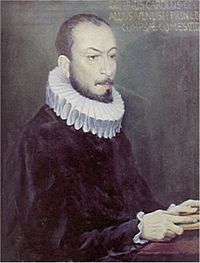 of Venosa and Count of Conza; he was born in Venosa on March 8th, 1566. Many of us know the extraordinary story of Gesualdo killing his wife and her lover whom he found in flagrante in his home, Palazzo di Sangro in Naples. His music is not as well known, which is a unfortunate, as Gesualdo had an enormous talent. He spent two years in Ferrara, then a major musical center, meeting with and listening to the music of the best Italian composers of the time (while there, he also married the Duke’s niece, Leonora d'Este). And while in Ferrara, he published the first four books of madrigals (eventually he’d publish two more). Luzzasco Luzzaschi was one of the Ferrarese composers who probably affected Gesualdo the most. He returned to the Gesualdo castle at the end of 1595 and remain there, secluded most of the time, for the rest of his life. Existing accounts of his moods and “melancholy” suggest that he was clinically depressed, which didn’t prevent him from composing both religious and secular music. Here’s Gesualdo’s sacred vocal piece for five voices, Tribulationem et dolorem inveni, composed in 1603. It was recorded in 1992 by Oxford Camerata, Jeremy Summerly conducting.
of Venosa and Count of Conza; he was born in Venosa on March 8th, 1566. Many of us know the extraordinary story of Gesualdo killing his wife and her lover whom he found in flagrante in his home, Palazzo di Sangro in Naples. His music is not as well known, which is a unfortunate, as Gesualdo had an enormous talent. He spent two years in Ferrara, then a major musical center, meeting with and listening to the music of the best Italian composers of the time (while there, he also married the Duke’s niece, Leonora d'Este). And while in Ferrara, he published the first four books of madrigals (eventually he’d publish two more). Luzzasco Luzzaschi was one of the Ferrarese composers who probably affected Gesualdo the most. He returned to the Gesualdo castle at the end of 1595 and remain there, secluded most of the time, for the rest of his life. Existing accounts of his moods and “melancholy” suggest that he was clinically depressed, which didn’t prevent him from composing both religious and secular music. Here’s Gesualdo’s sacred vocal piece for five voices, Tribulationem et dolorem inveni, composed in 1603. It was recorded in 1992 by Oxford Camerata, Jeremy Summerly conducting.
Antonio Vivaldi was born on March 4th of 1678 in Venice, more than a century after Gesualdo. By then the Baroque style was all the rage. Famous during his lifetime (his influence on Bach, who made a number of transcriptions of Vivaldi’s works, is well known), Vivaldi was almost forgotten by mid-18th century and rediscovered only in the 20th century. His Four Seasons remain (excessively) popular, but thanks in large part to Cecilia Bartoli, we’re now familiar with his operas too. Out of almost 500 instrumental concertos (many for the violin) some are very good, other are routine. Here’s an example of Vivaldi’s church music, Sileant Zephyri from his motet Filiae maestae Jerusalem performed by Philippe Jaroussky and his Ensemble Artaserse.
Carl Philipp Emanuel Bach, the fifth child of Johann Sebastian, was also born this week, on March 8th of 1714 in Weimar. While his father loved Vivaldi’s music, Carl Philipp Emanuel, like most German composers of his generation, was quite critical of him. And here are other composers also born this week: Maurice Ravel, Bedřich Smetana, Heitor Villa-Lobos, and Kurt Weill.
Bernard Haitink will celebrate his 91st birthday on March 4th, and the late Lorin Maazel would’ve been 90 on March 6th.Permalink
This Week in Classical Music: February 24, 2020. Chopin and his interpreters. Next Sunday, March 1st is Frédéric Chopin’s 210th birthday. We’ve been writing about the great composer practically every year but not about some of the famous interpreters of his music. Last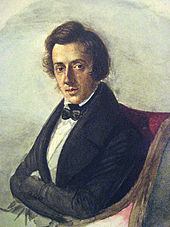 week we promised to get back to Benno Moiseiwitsch, who was born in Odessa on February 22nd of 1890. At the age of nine he won the Anton Rubinstein Prize (not to be confused with the Arthur Rubinstein competition, held in Tel Aviv since 1974) and five years later, in 1904, moved to Berlin to study with Theodor Leschetizky. He stayed in Berlin for four years after which his family moved to England. He played his London debut concert in 1909. After WWI Moiseiwitsch engaged in many tours in the US and Europe and for a while taught at the Curtis Institute, where Josef Hofmann was the director. In 1937 he took British citizenship. Rachmaninov used to say that Moiseiwitsch plays his music better than he, Rachmaninov, did. Here’s Benno Moiseiwitsch playing Chopin’s Scherzo No. 3 in C sharp minor Op. 39. This recording was made in 1949. And here he’s playing Chopin’s Nocturne in E Op. 62 No. 2. This one was made later, in 1958, when Moiseiwitsch was 68. Benno Moiseiwitsch died in London on April 9th of 1963.
week we promised to get back to Benno Moiseiwitsch, who was born in Odessa on February 22nd of 1890. At the age of nine he won the Anton Rubinstein Prize (not to be confused with the Arthur Rubinstein competition, held in Tel Aviv since 1974) and five years later, in 1904, moved to Berlin to study with Theodor Leschetizky. He stayed in Berlin for four years after which his family moved to England. He played his London debut concert in 1909. After WWI Moiseiwitsch engaged in many tours in the US and Europe and for a while taught at the Curtis Institute, where Josef Hofmann was the director. In 1937 he took British citizenship. Rachmaninov used to say that Moiseiwitsch plays his music better than he, Rachmaninov, did. Here’s Benno Moiseiwitsch playing Chopin’s Scherzo No. 3 in C sharp minor Op. 39. This recording was made in 1949. And here he’s playing Chopin’s Nocturne in E Op. 62 No. 2. This one was made later, in 1958, when Moiseiwitsch was 68. Benno Moiseiwitsch died in London on April 9th of 1963.
Myra Hess and Lazar Berman were also born this week. Hess is just three days younger than Moiseiwitsch: she was born on February 25th of 1890. Moiseiwitsch moved to London as a teenager, Hess, also Jewish, was born there. Hess is better known for her interpretations of Bach, Mozart and Beethoven, and of course, for the courageous free concerts she gave in London during WWII while the Germans were bombing the city, but she also played Chopin. Here’s a wonderful, unhurried 1949 live recording of Myra Hess playing Chopin Fantasie in F minor Op. 49.
The Russian-Jewish pianist Lazar Berman would be 90 on February 26th: he was born in Leningrad (now St-Petersburg) on that day in 1930. Berman was a tremendous virtuoso and a great Lisztian but his repertoire was broad and of course Chopin was part of it. Here, from 1973, his recording of Chopin’s Polonaise in A-flat major op.53, "Héroique."Permalink
This Week in Classical Music: February 17, 2020. Handel and Corelli. This week we celebrate the 335th birthday anniversary of George Frideric Handel, who was born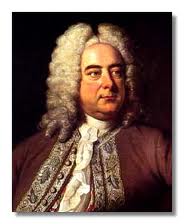 in Halle on February 23rd of 1685. We’ve written about this great composer many times: here, for example is the entry from last year. In our library you can find samples from several of his operas (he composed almost 50 of them), such as Rinaldo, Xerxes, Ariodante, or Jiulio Cesare. Not all of them are equal, but Rodelinda is one of the most beautiful. It was written in 1725 and premiered at the King’s Theatre in Haymarket, London. The famous soprano Francesca Cuzzoni sung the role of Rodelinda, Queen of Lombardy. Senesino, Handel’s favorite castrato singer, was Bertarido, the defeated King of Lombardy. Another Handel’s favorite, the baritone Giuseppe Maria Boschi sung the role of the duke of Turin. According to Charles Burney, the 18th century musicologist and historian, during the premier of Rodelinda Cuzzoni “wore a brown silk dress trimmed with silver, with the vulgarity and indecorum of which all the old ladies were much scandalized, the young adopted it as a fashion, so universally, that it seemed a national uniform for youth and beauty." (The contemporary caricature features Cuzzoni at the center and Senesino at the left).
in Halle on February 23rd of 1685. We’ve written about this great composer many times: here, for example is the entry from last year. In our library you can find samples from several of his operas (he composed almost 50 of them), such as Rinaldo, Xerxes, Ariodante, or Jiulio Cesare. Not all of them are equal, but Rodelinda is one of the most beautiful. It was written in 1725 and premiered at the King’s Theatre in Haymarket, London. The famous soprano Francesca Cuzzoni sung the role of Rodelinda, Queen of Lombardy. Senesino, Handel’s favorite castrato singer, was Bertarido, the defeated King of Lombardy. Another Handel’s favorite, the baritone Giuseppe Maria Boschi sung the role of the duke of Turin. According to Charles Burney, the 18th century musicologist and historian, during the premier of Rodelinda Cuzzoni “wore a brown silk dress trimmed with silver, with the vulgarity and indecorum of which all the old ladies were much scandalized, the young adopted it as a fashion, so universally, that it seemed a national uniform for youth and beauty." (The contemporary caricature features Cuzzoni at the center and Senesino at the left). 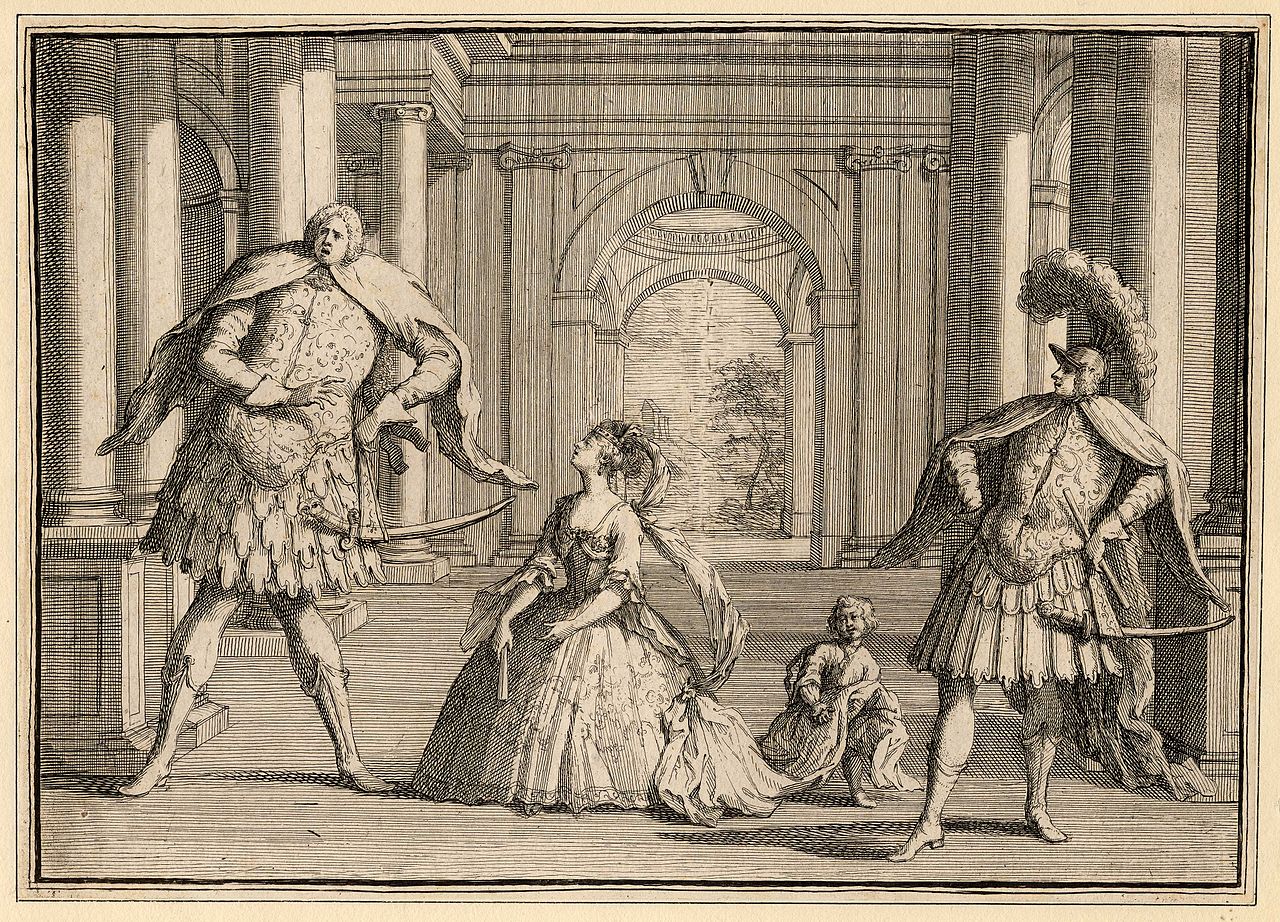 Burney thought very highly of the opera and wrote that Rodelinda "contains such a number of capital and pleasing airs, as entitles it to one of the first places among Handel's dramatic productions." Here’s the aria Io t'abbraccio (I embrace you) from Act II of the opera. Rodelinda is sung by the mezzo-soprano Magdalena Kozena; Bertarido is David Daniels, a counter tenor.
Burney thought very highly of the opera and wrote that Rodelinda "contains such a number of capital and pleasing airs, as entitles it to one of the first places among Handel's dramatic productions." Here’s the aria Io t'abbraccio (I embrace you) from Act II of the opera. Rodelinda is sung by the mezzo-soprano Magdalena Kozena; Bertarido is David Daniels, a counter tenor.
When Handel was twenty, he moved to Italy and lived there for the next five years, mostly in Rome. There he met Arcangelo Corelli, thirty-two years older (Corelli was born on February 17th of 1653) and already famous. Still, a rivalry of sorts developed. Corelli was not just a composer, he was renowned as a violinist. As a matter of taste, Corelli played and composed for the violin mostly in the middle register of the instruments. Handel also played the violin (and the keyboard). His overture to the oratorio The Triumph of Time and Truth (with the aria Lascia la spina, which Handel later reworked into the famous Lascia ch’io pianga in Rinaldo), had a high note, which Corelli refused to play. Handel did, and thus offended Corelli terribly. But in reality, Handel liked Corelli’s music and fashioned his Concerti Grossi op. 6 after Corelli’s own op. 6 Concerti. Here’s Corelli’s Concerto grosso in G minor, Op. 6, No. 8 (Christmas Concerto). It’s performed by I Musici.
Two very interesting pianists were also born this week: Benno Moiseiwitsch on February 22nd of 1890 and Nikita Magaloff on February 21st of 1912. We’ll celebrate Moiseiwitsch’s birthday next week together with Chopin’s.Permalink
This Week in Classical Music: February 10, 2020. Praetorius, Price, Godowsky. A couple of weeks ago we celebrated a relatively unknown German Renaissance composer, Johann Hermann Schein (for those who missed that week’s entry, here’s his sacred madrigal Da Jakob vollendet hatte from the collection Israelis Brünnlein, “The Fountains of Israel.” We think it’s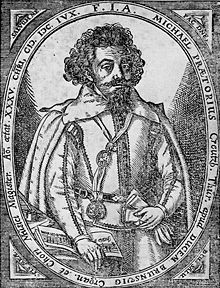 absolutely first rate). Michael Praetorius was 15 years older than Schein: he was born on February 15th of 1571. Those 15 years make a big difference: Praetorius was probably the first German composer of significance, as at that time the music centers were concentrated in Italy; not long after, it was not just Schein, but also Heinrich Schütz that wrote fine music in Germany, and development was moving toward the Baroque. Praetorius lived much of his adult life in Dresden, at the court of Johann Georg I, Elector of Saxony. There he met a number of Italian musicians and through them encountered the polychoral music of Giovanni Gabrieli, which impressed him very much. Here’s an example, Vom Himmel Hoch, from the collection of choral music, Polyhymnia Caduceatrix et Panegyrica, published in 1619. Musica Fiata and La Capella Ducale are conducted by their founder, Roland Wilson.
absolutely first rate). Michael Praetorius was 15 years older than Schein: he was born on February 15th of 1571. Those 15 years make a big difference: Praetorius was probably the first German composer of significance, as at that time the music centers were concentrated in Italy; not long after, it was not just Schein, but also Heinrich Schütz that wrote fine music in Germany, and development was moving toward the Baroque. Praetorius lived much of his adult life in Dresden, at the court of Johann Georg I, Elector of Saxony. There he met a number of Italian musicians and through them encountered the polychoral music of Giovanni Gabrieli, which impressed him very much. Here’s an example, Vom Himmel Hoch, from the collection of choral music, Polyhymnia Caduceatrix et Panegyrica, published in 1619. Musica Fiata and La Capella Ducale are conducted by their founder, Roland Wilson.
Today is also the birthday of the great American soprano Leontyne Price: she just turned 93! Price was born in Laurel, a small town in the state of Mississippi. She studied at the Juilliard and in late 1950’s sung in Europe to great acclaim, In 1960s she became the first African American soloist at the Metropolitan opera – the phenomenal Marian Anderson sang only one role at the Met, that of Ulrica in Verdi’s Un Ballo in Mschera, a shame and a great loss to all opera lovers. Leontyne Price’s repertoire was very broad, but it was in Verdi that she was at her best – and internationally famous. Aida, Leonora in Il trovatore, Leonora in La forza del destino, Amelia in Un ballo in Maschera – few sopranos could rival Price in these roles. Here’s Pace, Mio dio, from Verdi’s La Forza del Destino in a 1984 live Metropolitan recording. James Levine conducts the Met orchestra.
One of the greatest pianists of the early 20th century, Leopold Godowsky was born 150 years ago, on February 13th of 1870. Of Jewish descent, he was born in Žasliai, a village halfway between Vilnius and Kanunas in what is now Lithuania but in 1870 was part of Russia’s Poland. Godowsky was one of the very rare self-taught pianists: he studied briefly in Berlin and that was the extent of his formal musical education. In 1884 he made his American debut in Boston; in the following years he toured across the country. From 1887 to 1890 he lived in Paris: a protégé of Camille Saint-Saëns, he played in all the fashionable salons. After a series of extraordinarily successful Berlin concerts in December of 1900 he moved to the city and lived there and in Vienna till the outbreak of WWI, when he moved back to the US. Godowsky was also a composer, writing a number of original works and paraphrases for the piano (those of the Schubert songs are famous). He made several recordings in the late 1920s but suffered a stroke in 1930. Godowsky died in New York on November 21st of 1938.Permalink
This Week in Classical Music: February 3, 2020. Palestrina, Peter Serkin. Giovanni Pierluigi da Palestrina might have been born on this day in 1525, although it could be any day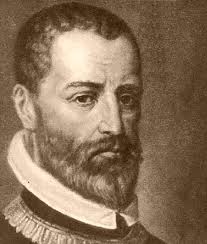 between February 3rd of 1525 and February 2nd of 1526: he died on February 2nd of 1594 and the eulogist mentioned that he was 68, and according to other sources, he died one day short of his 69th birthday. One of the greatest composers of the late Renaissance, he was recognized as such during his lifetime: in 1575, the agent of the Duke of Ferrara, who, we can assume, was very knowledgeable in these things as the Duke’s court was Italy’s musical center, had written of Palestrina that he was “now considered the very first musician in the world.” Palestrina’s output was enormous: 104 masses are extant, about 300 motets and many other pieces of music. In addition to the church music, he wrote 140 madrigals, some set to pieces of secular poetry. Here’s an example, a madrigal Chiare fresche e dolci acque (Clear, sweet fresh water/where she, the only one who seemed/woman to me, rested her beautiful limbs – a sonnet by Petrarch). Pro Musica Antiqua, Milan, is directed by Giovanni Vianini.
between February 3rd of 1525 and February 2nd of 1526: he died on February 2nd of 1594 and the eulogist mentioned that he was 68, and according to other sources, he died one day short of his 69th birthday. One of the greatest composers of the late Renaissance, he was recognized as such during his lifetime: in 1575, the agent of the Duke of Ferrara, who, we can assume, was very knowledgeable in these things as the Duke’s court was Italy’s musical center, had written of Palestrina that he was “now considered the very first musician in the world.” Palestrina’s output was enormous: 104 masses are extant, about 300 motets and many other pieces of music. In addition to the church music, he wrote 140 madrigals, some set to pieces of secular poetry. Here’s an example, a madrigal Chiare fresche e dolci acque (Clear, sweet fresh water/where she, the only one who seemed/woman to me, rested her beautiful limbs – a sonnet by Petrarch). Pro Musica Antiqua, Milan, is directed by Giovanni Vianini.
While we’re not sure about Palestrina’s exact birthdate, we can be fairly certain that Felix Mendelssohn was born on this day in 1809. It took almost three centuries for music to evolve from the polyphony of Palestrina to the romanticism of Mendelssohn, but just three quarters of a century to propel it to the twelve-tone technique of Alban Berg. Berg was born in Vienna on February 9th of 1885. Also on February 9th, in 1937, a wonderful German soprano was born, Hildegard Behrens. She was great in the Wagnerian repertoire. Here’s the last aria of Wagner’s Tristan und Isolde, Mild und leise wie er lächelt (Mildly and gently, how he smiles). In this 1986 recording Hildegard Behrens sings Isolde; the Munich Radio Orchestra is conducted by Peter Schneider.
Some sad news: Peter Serkin died on February 1st from pancreatic cancer at the age of 72.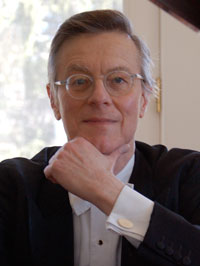 Peter was born on July 24th, 1947 in New York, his father was the renowned pianist Rudolf Serkin, his grandfather – the violinist Adolf Busch. Despite, or maybe because of this, Peter was never comfortable with the classical music establishment. He started performing in public at the age of 12. In 1965, at age 18, he recorded Bach’s Goldberg Variations, which were very well received (he made three other recordings of the Variations, the last one in 1994). Then, at the age of 21, he stopped playing music altogether and didn’t touch the piano for the next three years. He said that he decided to resume playing after listening to a radio broadcast of Bach’s music. Peter Serkin was exceptionally good in the modern repertoire. He played Olivier Messiaen Vingt Regards sur L'Enfant Jesus, an extremely complex 20-part suite lasting about two and a half hours, from memory. His recording of this piece is considered one of the very best. Peter was still playing concerts in 2019. His death is a great loss.Permalink
Peter was born on July 24th, 1947 in New York, his father was the renowned pianist Rudolf Serkin, his grandfather – the violinist Adolf Busch. Despite, or maybe because of this, Peter was never comfortable with the classical music establishment. He started performing in public at the age of 12. In 1965, at age 18, he recorded Bach’s Goldberg Variations, which were very well received (he made three other recordings of the Variations, the last one in 1994). Then, at the age of 21, he stopped playing music altogether and didn’t touch the piano for the next three years. He said that he decided to resume playing after listening to a radio broadcast of Bach’s music. Peter Serkin was exceptionally good in the modern repertoire. He played Olivier Messiaen Vingt Regards sur L'Enfant Jesus, an extremely complex 20-part suite lasting about two and a half hours, from memory. His recording of this piece is considered one of the very best. Peter was still playing concerts in 2019. His death is a great loss.Permalink